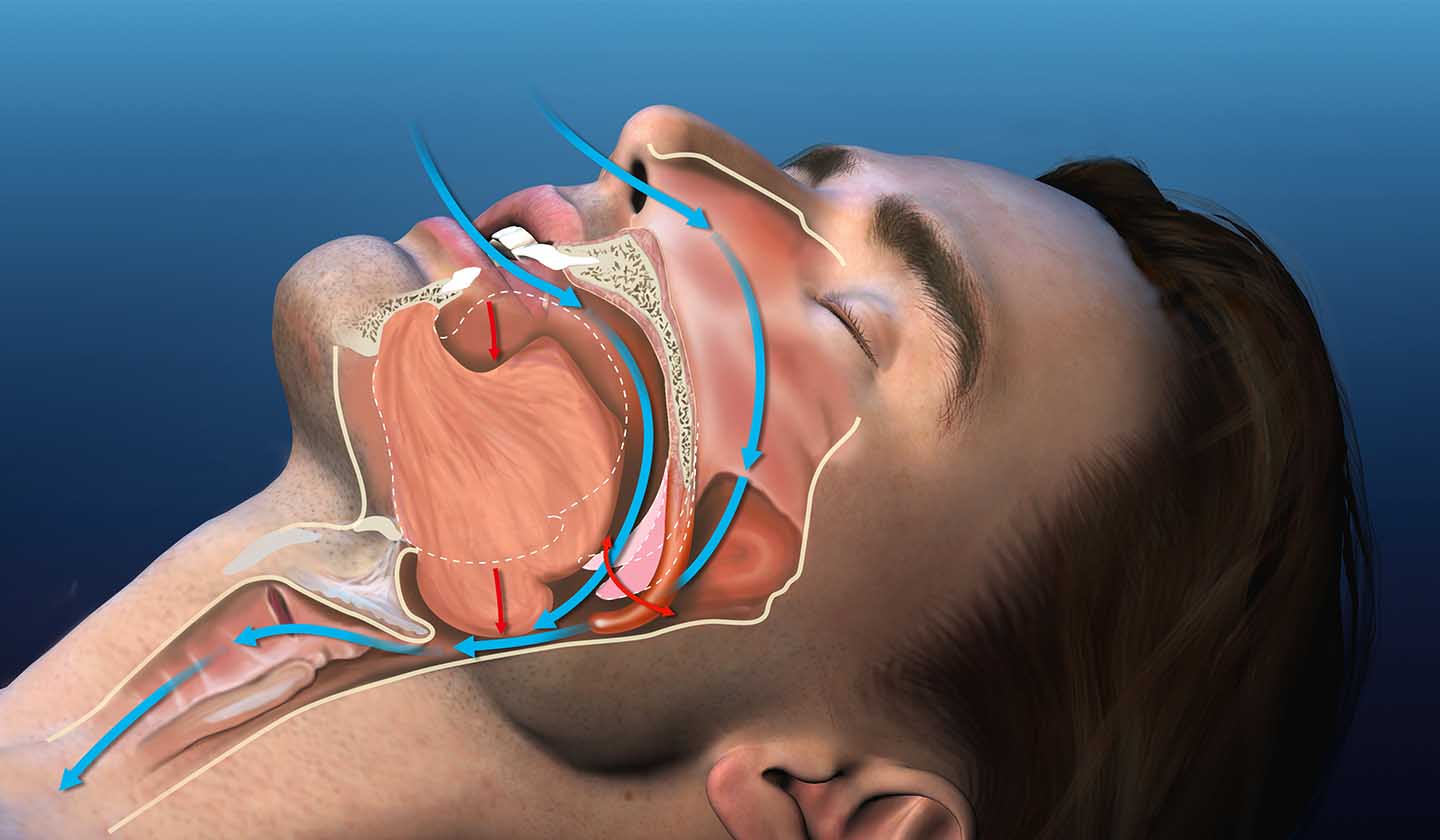Respiratory system
Snoring - Leave your bike outside

Snoring, or roncopathy, is the hoarse or harsh sound emitted during sleep that occurs when air flows past the upper airways.
It is a quite common sleep disorder whose prevalence increases with age and is more frequent in men. It is estimated that approximately 60% of men and 45% of women snore at the age of 60.

What causes snoring?
As you breathe, air flows past relaxed tissues in your throat and the tissues of the oropharynx (palate and pharyngeal walls) vibrate. During sleep, these soft tissues become more relaxed, narrowing the airways, and making it hard for air to travel down toward the lungs.

Factors that favour or worsen snoring
There are several factors that can contribute to snoring, either because they cause narrowing of the upper airways, or because they contribute to the relaxation of tissues or to the irritation of the airways.
- Being overweight (due to the pressure that fat exerts on the airways);
- Upper respiratory tract tissues flaccidity (which becomes evident around the age of 30-40);
- Nasal congestion, allergic rhinitis, deviated nasal septum (as it hinders nasal breathing and forces the person to breathe through the mouth);
- Hypertrophy of tonsils and adenoids (leading to the narrowing of the upper airways);
- Sleeping on your back (due to the effect of gravity on your throat);
- Alcohol intake (it makes breathing control by the CNS more difficult);
- Drugs that cause drowsiness/sedation, such as antihistamines, sedatives, muscle relaxers (cause muscle hypotonia in the muscles of the tongue and throat);
- Smoking (it irritates the tissues of the respiratory system);
- Gastroesophageal reflux (causes irritation of the upper airways);
- Pregnancy (especially in the second half) and menopause.

Consequences
Snoring can affect the quality of life at the social, psychological, and physical levels. Snoring individuals usually have a more superficial and therefore less restful sleep, which leads to difficulties in concentrating during vigil, as well as to fatigue and irritability. As a result of snoring, the following can also occur:
- Dry mouth and morning sore throat;
- Mood changes;
- Problems in marital relationships

Prevention
To prevent snoring, recommendations that involve a healthy lifestyle should be considered. Please, consider the following:
- Avoid eating heavy meals at dinner time;
- Avoid drinking alcohol 3 hours before going to bed;
- Try to maintain regular sleep patterns;
- Practice physical exercise regularly (as it keeps your muscles toned);
- Maintain a healthy weight;
- Avoid sleeping on your back. Try to sleep on your side or with the head of the bed elevated;
- Treat your runny nose with appropriate sprays or drops (ask your pharmacist for advice);

Other treatment available:
- Nasal patches (especially effective when there are problems with nasal breathing);
- Dilating nasal clips (they improve nasal breathing);
- Oral sprays (to lubricate and tone the soft tissues of the upper throat);
- Mandibular advancement prostheses (dentistry area);
- Surgery (in specific cases, it reduces sagging of the soft palate and size of the uvula).
Please note...
Snoring can be associated with another sleep disorder: Obstructive Sleep Apnoea Syndrome (OSAS). When the passage of the air through the airways becomes so difficult that the patient stops breathing (apnoea) for several seconds (>10s), on several occasions (≥5 times) during sleep, which normally causes the patient's recurrent awakenings.
If you snore persistently for no apparent reason, or if you feel extreme and incapacitating fatigue during the day, if you wake up frequently at night with difficulty breathing, talk to your doctor about it.
Sources
iSaúde
Farmácia Distribuição Magazine
Também lhe poderá interessar
Prevention






